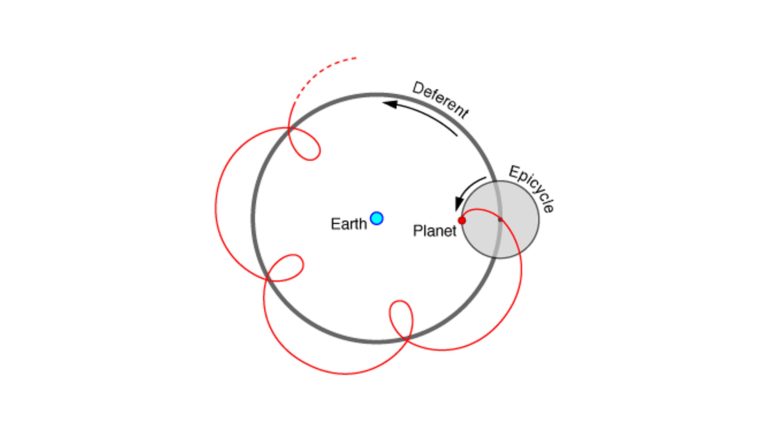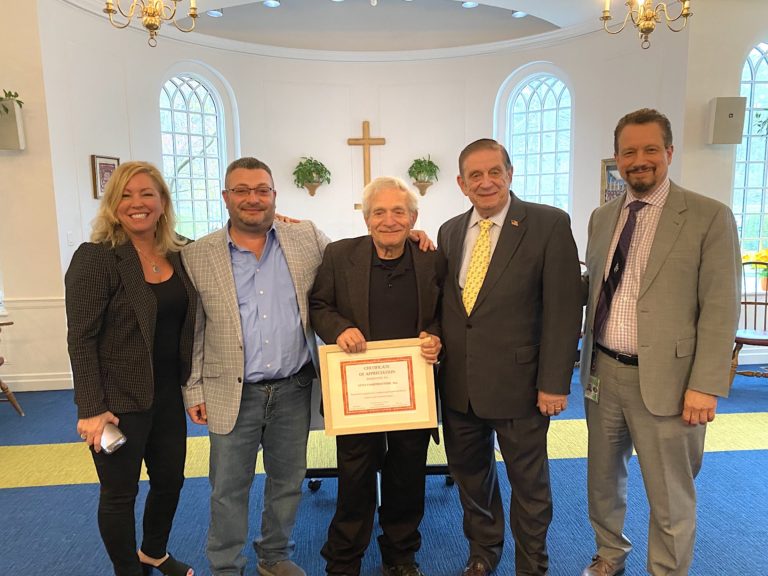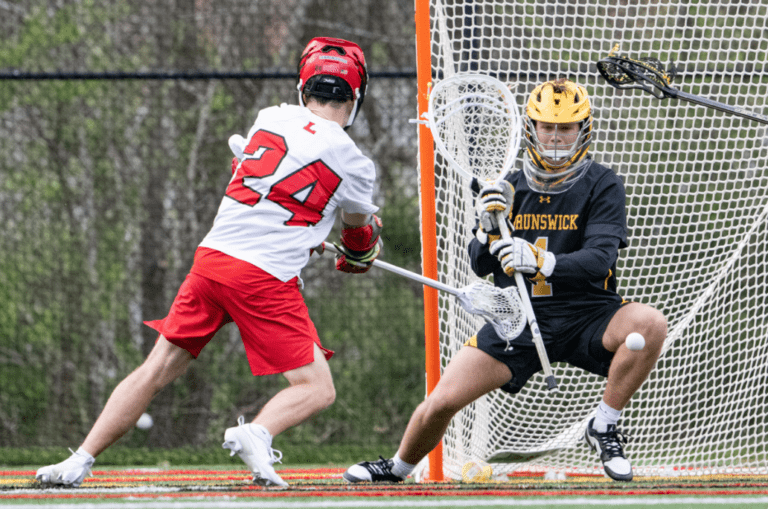
Drew Williams Featured Speaker at United Nations
Bishop Andrew Williams, known to Greenwich residents as Drew Williams, addressed members of the United Nations this week at the United Nations annual Prayer Breakfast on September 15 as the United Nations celebrated seventy-five years of global service.
The President-elect of the General Assembly, Volkan Bozkır, was in attendance and spoke, together with The Secretary General, António Guterres and the US Ambassador Kelly Craft who was confirmed by the United States Senate on July 31, 2019 (all pictured below left to right). Bishop Andrew will be introduced by Hungarian Ambassador, Her Excellency Katalin Bogyay. Bishop Andrew commented, “It was a great honor to be with the UN delegates in December 2019 at their annual Christmas Dinner, hosted by the Christian Embassy. I was delighted that they invited me back!”
Given the current climate, the Prayer Breakfast was virtually relayed to heads of state, ambassadors, and diplomats from all around the world.
His speech follows here:
INTO THE STORM…
It was a joy to be with so many of you, last year, at the Christmas dinner. It is my great honor to join you for this annual Prayer Breakfast, in this the United Nations’ 75th anniversary year. I stand with the world in giving thanks for, celebrating and saluting your enduring selfless service.
How do you recall the early days of your diplomatic service? Diplomacy on the world stage could never be described as straightforward or without challenge – but looking back – was it just a little bit easier? Looking back over my own ministry, I can see that authentic leadership, the kind of leadership that endeavors to make a significant and lasting difference for the common good – by necessity, is a magnet for pain.
You have audaciously pledged to sustainable development goals that constitute the blueprint for a better and more sustainable future for all. You have courageously covenanted to face head on the greatest global challenges, including poverty, inequality, climate change, environmental degradation, peace and justice. You have committed to pursue a global partnership, in such a way, that no one gets left behind. But there can be no real progress without change and no change without pain. “Diplomacy…it’s a living martyrdom!”
And along the way, if the challenges to your work were not already significant, it has gotten not a little stormy. In the midst of a global pandemic we are witnessing increased global instability, fear and unrest. Do you feel like you are rowing against swirling global currents? Attempting to find your way with the wind and rain unceasing and hard pressed against you? And what is perhaps, at first sight, unsettling is that God knew about this storm when he asked you to get into this diplomatic boat and make this trip with Him.
I have been in this role for about eighteen months as the Anglican Bishop of New England I am still working out what I need to be doing on a fair day! Let me be candid, when I was signed up, I did not see Global pandemic in the small print! We are not, however, the first ambassadors for God’s work, who have struggled with this tension. That is the tension of God setting us up to sail into the oncoming storm.
HOW DID THE DISCIPLES FIND THEMSELVES IN THIS STORM?
Jesus is already in the boat. He has been using it as a pulpit all day to teach the crowd. His voice has been amplified by the natural amphitheater of the bay but now He is exhausted. From within the boat, some time before He falls asleep, Jesus says: “Let us go across to the other side.” Mark 4:35 The “other side” was the place of the Gentiles. Having ministered exclusively to the Jewish people, this boat trip across the lake, is the very first venture into non-Jewish territory.
THE SEA AS A CHARACTER IN THIS STORY.
Biblically, the sea is often portrayed as a symbol of chaos: all that opposes the advance of God’s Kingdom – the advance of God’s great restoration movement of peace and human flourishing. In this account, this movement of God’s peace is about to be extended – to the place of the Gentiles – and the sea rose up to oppose Him. Jesus is fulfilling the prophecy: to be “a light to enlighten the world.” And He is – taking them with Him. He is leading them into the eye of the storm.
Very deliberately Jesus has called us into the boat and taken us with Him into the storm. This has been and continues to be a season of great turbulence that has tested and stretched us beyond the depths of our experience and the breadth of our service. But if Jesus is any example here, He is showing us that, there will always be resistance when new ground is being taken for peace and human flourishing. Storms are inevitable whenever we push out with God’s agenda and leave the security of the shoreline. When we obediently follow Jesus, into deeper waters, we should expect it to get a little choppy!
HOW COULD JESUS SLEEP?
How could Jesus sleep in the middle of the storm? “But He [Jesus] was in the stern, asleep on the cushion.” Mark 38a And, notice Mark’s little dig at Jesus, “asleep on the cushion…” there is only one cushion on this boat and Jesus is asleep on it!
It had to be that Jesus’ security and peace came from someplace other than the weather. He knew He was safe because all His security and confidence came from the Father. Of that security and peace, King David could write, “In peace I will both lie down and sleep; for you alone, O Lord, make me dwell in safety.” Psalm 4:8 A security, an assurance and a profound confidence that it allowed Jesus to lie down in the boat and sleep.
WHAT DID THE DISCIPLES WANT JESUS TO DO?
If you are a fisherman and your boat is filling with water – what do you do? You BAIL out the boat. They want Jesus to get off His cushion and help them to bail out the boat. Because He is not, they presume He does not care about them! Isn’t this how it feels when we are in a storm and Jesus is apparently NOT answering our frantic prayers? In those moments, we might conclude that God does NOT exist or perhaps more often that He simply does not care. C. S. Lewis put it this way: “Not that I am (I think) in much danger of ceasing to believe in God. The real danger is of coming to believe such dreadful things about Him. The conclusion I dread is not “So there’s no God after all,” but “So this is what God’s really like. Deceive yourself no longer.”
WHAT DOES JESUS DO?
He awoke and spoke directly to the storm: “He…rebuked the wind and said to the sea, “Peace! Be still!” And the wind ceased, and there was a great calm.” Mark 4:39 The Word that spoke order out of chaos, the living Word that hovered over the face of the waters and said “Let there be light,” the same voice that spoke to the chaos of the waters and spoke into being ocean and dry land…The same voice – now speaks to the fury of the storm. In the Amplified translation of the Bible we find this moment rendered with the phrase, “Hush!” or “Be muzzled.” And the wind ceased. And there was great calm. The funny thing is, the disciples are still afraid!! So, Jesus asks them: “[He said to them], “Why are you so afraid? Have you still no faith?” Mark 4:40
In other words, “You just wanted me to bail you out of the storm. I want you to know the power of God to carry you through the storm.”
Fear very often seeks to push God aside and take over responsibility for my comfort, care and protection all of which God has said He will faithfully provide. The Lord very emphatically says, “I, I am he that comforts you!” (Isaiah 51:12). And yet fear barges in and tries to take over the role of protector, guide and comforter. It’s as if fear climbs up on God’s throne and presumes to say, “Don’t do that; You could get hurt!” I think for the first time I saw clearly that fear has the most toxic capacity to set limits on our obedience to God. When you think about it, isn’t it often the case that we serve the one we fear?
LET ME OFFER THIS FINAL THOUGHT:
Yes, Jesus led them into the storm – but He went with them. He was never absent – not for a moment. In the heat of battle, in the eye of the storm, God looks us right in the eye and levels with us. And this is what he says: “I will never leave you nor forsake you” (Hebrews 13:5).
Let me unpack the unusual force of this statement: Not once in the past 75 years and at no point in the next 75 years and beyond, not ever; never, never, never, in any circumstance whatsoever, will God fail you.
For more information or to see the speech as it was delivered, you may go to:
https://adne.org/news-from-the-diocese-1/qv92q5yk91yqt0pxohew0tped5rckh




